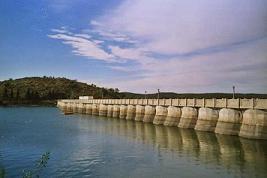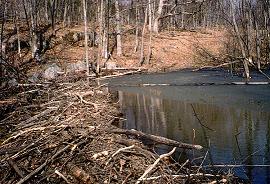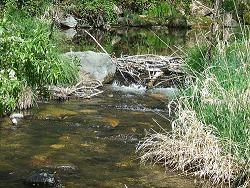Will The Dam Hold?



Goal/Essential
Question:
What characteristics does a dam need to be strong enough to withstand a flood?
Role:
Over the past few weeks we
have been learning about the effects of water on land surface. We have performed experiments to observe
specific effects water can have on land, such as erosion, the formation of
deltas, plateaus, channels, basins, and canyons. We have also observed water meander down a
course of land, taking with it sediments from the soil. We learned that the
Our last observation was of
the damage that can result when flash flooding occurs. We
observed that land located in a floodplain is more prone to damage than land
away from a river or other body of water.
Our lesson today and over the
next couple of sessions will be to explore the use of dams to stop the flow of
water and to keep water damage to a minimum. Dams can occur naturally, they can
be created by animals, and they can be man made. However, they all do the same thing, stop or
slow down the flow of water.
Today, you and your partners
in your group using a variety of materials will design and build a dam in your water
tray to stop the flow of water. Keep in
mind the experiments, observations, and conclusions you and your group members
have made over these past few weeks.
While working together, you
should keep in mind the group rules of conduct posted in the classroom. You
will also want to keep your voices down.
Although the groups are not in competition to see who builds the most
effective dam, you want to make sure no one borrows your ideas!
Your group will need to
produce a sketch of your dam in your journal book. You will also make a list of materials you used
to build your dam, and some comments as to how the dam was put together. Include a comment as to what you think will
make your dam strong. After all the information
is gathered and agreed to the typist in your group will record the information
onto the record sheet using the group laptop computer and the Wiki website. Make sure you post in the correct location
for your specific group. Remember, each
person has a job in the group and is responsible for their part.
Once the dams are built we
will pour a predetermined amount of water over each landscape to test the
effectiveness of the design of your dam.
After the water is introduced the group partners need to record the
observations once again onto the forms, and then post this information onto the
electronic form on the Wiki site. Remember to record what everything looked
like, decide if the other dams held, why do you think it did or didn’t. After you are done commenting on your groups
dam, you will observe the other groups and their results and record why you
think their dams were effective or not. Follow the same format, record your
information, then enter it onto the electronic form in
Wiki.
After all the information has
been gathered and compiled we will review and discuss the information using the
SmartBoard.
With this information we will strive to conclude through discussion and
evidence what characteristics are needed to create a dam to withstand flooding.
PRODUCT:
This
experiment will take several class sessions. Each group will design and create a
dam, observe and complete forms associated with the design and construction of
the dam, comparing and contrasting other dams built by other groups, and your
postings onto Wiki.
Individually, each person will
need to create a product that answers the essential question, “What characteristics
does a dam need to withstand a flood?” You have several choices to demonstrate
this knowledge. You may write a summary
or a description of the characteristics of a dam that withstands flooding. Another option would be to create a visual
such as a poster to explain characteristics of a strong dam. Another option would be to produce a
model. Please keep in mind the time constrains
of this assignment. If you choose to
create a product requiring materials not available in the classroom you will
have to provide them yourself. Computers and any programs we have available may
be used to produce your assignment.
STANDARDS and
CRITERIA [INDICATORS]:
You will earn three grades for
this assignment.
One grade will be a group
grade using our classroom group participation rubric. Were the charts, forms
and questions filled out effectively for later individual use; did you post the
information onto the Wiki site as directed?
The
second grade will be earned individually based on a rubric. Each of you will be responsible to produce a
product detailing the characteristics a dam needs to be effective against a
flash flood. If you choose to write a
summary, your sentence structure along with your grammar, spelling, and punctuation
must be correct. You must be clear and
concise in your summary or description of the characteristics. You will present
this to your classmates. If you choose
to produce a visual, make sure your visual is labeled with the important parts
of the dam, and if you are producing a drawing it is in color. You must also be prepared to verbally explain
the visual you produced.
The third grade you earn will
be completed after hearing and seeing each person’s assignment. You will self-evaluate your assignment and
decide if you could have included any additional information in your
conclusion. A form has been provided for this.
Remember, you will not earn your grade based on what other students have
done; you are just using your classmates work to help you think about your
work, what you did well, what you could have done better.
Standards
STANDARD 5.8 (Earth Science) All students will gain an understanding of the
structure, dynamics, and geophysical systems of the earth.
C. Processes that Shape the Earth.
1. Summarize the process involved in the rock cycle and describe the characteristics of the rocks involved.
Utilize various tools such as map projections and topographical maps to interpret features of Earth's surface.
STANDARD 8.1 (Technology): All students will use computer applications to gather and organize information and to solve problems.
B. Application of Productivity Tools
10. Determine when technology tools are appropriate to solve a problem and make a decision.
Modifications
Additional modifications should be made for students with IEPs
or 504 based in individual educational programs and needs.